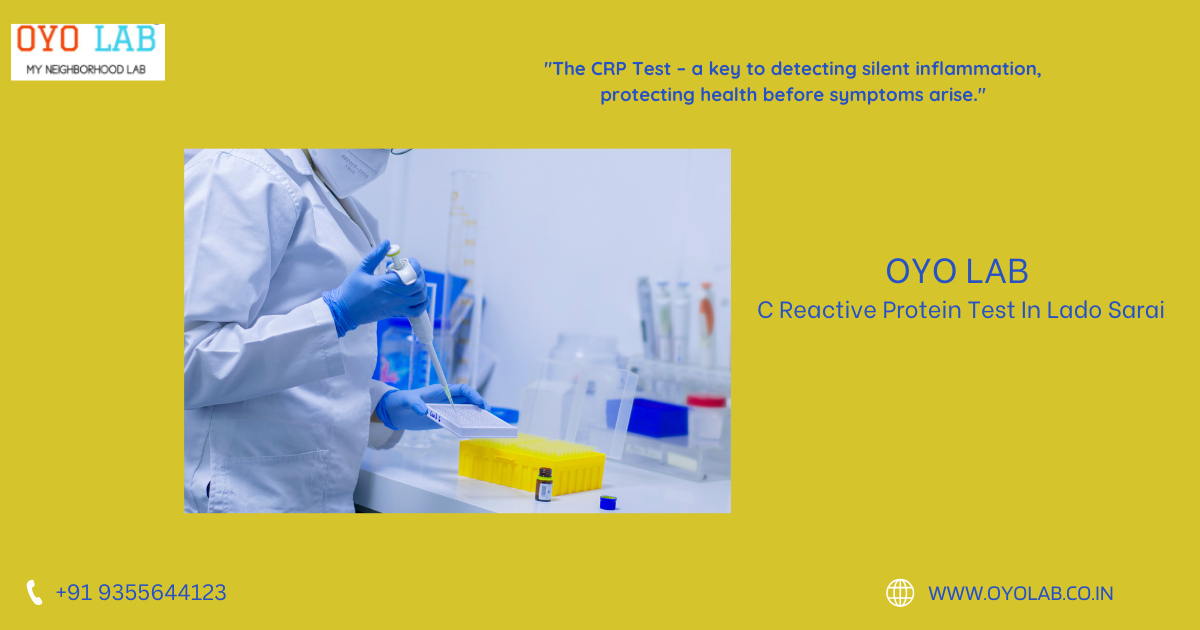
C Reactive Protein Test In Lado Sarai
By Shilpa | March 19, 2025
What Is
The C-Reactive Protein (CRP) Test is a Blood Test that measures the level of CRP, a protein made by the liver in response to inflammation in the body.
Why is the CRP Test Done?
Doctors use the CRP test to detect and monitor:
- Infections (bacterial or viral)
- Chronic inflammatory diseases (e.g., rheumatoid arthritis, lupus)
- Heart disease risk (high CRP levels may indicate heart problems)
- Autoimmune disorders
- Post-surgical complications (detects infections or inflammation)
How is it Performed?
A blood sample is taken from a vein in your arm and analyzed for CRP levels.
Interpreting Results
- Low CRP (Normal): Little to no inflammation.
- Moderate CRP: Mild inflammation (e.g., minor infections, chronic conditions).
- High CRP: Severe infection, inflammation, or increased risk of heart disease.
Importance Of C Reactive Peotein Test
The CRP Test is a vital tool for detecting and monitoring inflammation in the body. Here’s why it is important:
1. Detects Infections Early
- Helps identify bacterial or viral infections, allowing for timely treatment.
- Useful in diagnosing sepsis, a life-threatening condition caused by severe infection.
2. Monitors Chronic Inflammatory Diseases
- Tracks inflammation levels in autoimmune diseases like:
- Rheumatoid arthritis
- Lupus
- Inflammatory bowel disease (IBD)
3. Assesses Heart Disease Risk
- High high-sensitivity CRP (hs-CRP) levels are linked to an increased risk of heart disease, stroke, and heart attacks.
- Helps in early detection of atherosclerosis (plaque buildup in arteries).
4. Evaluates Treatment Effectiveness
- Monitors whether anti-inflammatory or infection treatments are working effectively.
- Helps in tracking recovery from surgeries or chronic illnesses.
Benefits Of C Reactive Protein Test
The CRP Test is a simple yet powerful tool for detecting and monitoring inflammation and infections. Here are its key benefits:
1. Early Detection of Infections & Inflammation
- Helps identify bacterial and viral infections early, leading to faster treatment.
- Useful for detecting sepsis, a life-threatening infection.
2. Assists in Diagnosing Autoimmune & Chronic Diseases
- Helps monitor conditions like:
- Rheumatoid arthritis (RA)
- Lupus
- Inflammatory Bowel Disease (IBD)
3. Evaluates Heart Disease Risk
- High-sensitivity CRP (hs-CRP) test detects low levels of inflammation linked to:
- Heart attacks
- Stroke
- Atherosclerosis (plaque buildup in arteries)
4. Monitors Treatment Effectiveness
- Tracks response to antibiotics, anti-inflammatory drugs, and chronic disease treatments.
- Helps adjust medications if inflammation persists.
5. Identifies Post-Surgical Complications
- Rising CRP levels after surgery may indicate infection or complications, allowing early intervention.
6. Quick, Simple & Non-Invasive
- Requires only a blood sample, making it a fast and easy diagnostic tool.